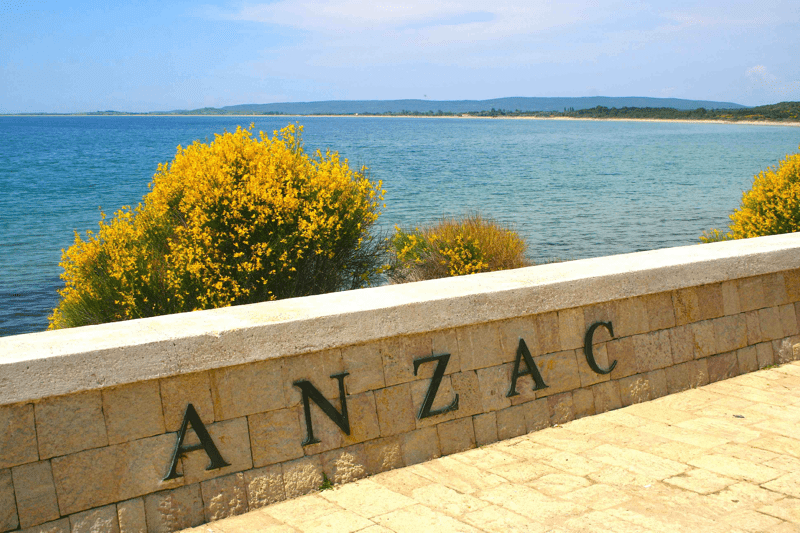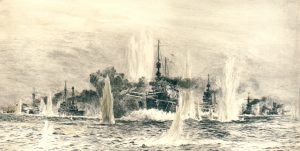
Boats carrying Australian, British, and New Zealand soldiers, advancing towards the shore, were all nervous about what awaited them, gripping their rifles. Captain Richard Willis, commander of C Company said, “It might have been a deserted land we were nearing in our little boats, then crack.”1 There was a door at the front of the boat that opened, and the machine gun fire was insane. Soldiers jumped off the boat fearing for their lives, equipped with their rifles and their 70-pounds worth of equipment. Some of them died instantly, but some made it to shore, only to be cut down by the barbwire that covered the shoreline, Captain Richard Willis described.2

It was war, the Great War, and the British and French troops needed to defeat the Ottoman Empire in order to get access to the Dardanelles straits. Their effort became known as the Gallipoli Campaign. Originally it was only a naval battle. With a fleet of eighteen warships, both British and French navies made an attempt to force their way through the Dardanelles. However, the Ottomans were too strong for them, and the attempt was a failure.3 The reason the Dardanelles were appealing at first was that they believed that it would not require many troops for this operation. How wrong they were. The Gallipoli campaign was conducted by General Sir Ian Hamilton with the plan on the 25th of April, 1915, to land at strategic points across the Gallipoli peninsula, with the ultimate goal of disarming the Ottoman forts at Kilitbahir, enabling the British navy to pass through the Dardanelles.4 The Anzacs were planning to land on Z beach as they were all code worded to S, V, W, X, and Z, all located at different points on the Peninsula. Z beach, located north Kabatepe, was planned to capture Hill 971 and another hill called Maltepe, and then move towards the Dardanelles and reinforce the British troops.5
April 25, 1915, the landing around Ari Burnu on the western side of the Gallipoli Peninsular was a complete mess, with the loss of 5,000 soldiers on the peninsula alone.6 Due to the horrific casualty number, it is now known as the ANZAC cove, in honor of these men. Gallipoli has become a defining moment in history for both Australian and New Zealand soldiers by defining both soldiers’ characteristics: endurance, determination, initiative, and brotherhood. For the Ottomans soldiers, it was the beginning of the decline in their domination of the war.7

The number of deaths in the trenches were diabolical. Over the whole eight months of the Gallipoli campaign, from April 25 to January 9, the allies lost 250,000 people, and the Ottomans lost around the same number. However, the initial landing at Gallipoli tallied up 60,000 people across all beach landings.8 Gallipoli was deemed a total failure overall. With so many casualties and not being able to achieve the objective of getting the naval ships through the Dardanelles, it has gone down in history as a failure of World War I. However, in Australian and New Zealand eyes, they are deemed heroes, going against all odds, fighting out numbered, and given the impossible you could say, for example the Battle of Lone Pine. But they were still able to carry out their duty and have gone down in history as imperishable.9
- Joshua Hammer, “A New View of the Battle of Gallipoli, One of the Bloodiest Conflicts of World War I,” Smithsonian.com, Febuary 01,2015. ↵
- Joshua Hammer, “A New View of the Battle of Gallipoli, One of the Bloodiest Conflicts of World War I,” Smithsonian.com. Febuary 01, 2015. ↵
- “The Anzac Portal,” Why Did Anzacs Land at Gallipoli? | The Anzac Portal ↵
- “Gallipoli: The First Day Centenary Edition,” Gallipoli Campaign, abc.net.au. ↵
- “Gallipoli: The First Day Centenary Edition,” Gallipoli Campaign, abc.net.au. ↵
- Nigal Steel, “What You Need To Know About The Gallipoli Campaign,” Imperial War Museums, June 26, 2018. ↵
- Nigal Steel, “What You Need To Know About The Gallipoli Campaign,” Imperial War Museums, June 26, 2018. ↵
- David Saul, “Time to Put the Record Straight on Gallipoli,” The Telegraph, April 25, 2015. ↵
- David Saul, “Time to Put the Record Straight on Gallipoli,” The Telegraph, April 25, 2015. ↵



36 comments
Enrique Segovia
I was unfamiliar with this battle, so this article turned out to be really informative for me. Even though it is a short article, I feel I learned a lot from it. Something sad about this battle is the amount of people who died; I think Gallipoli is a battle commonly ignored by history textbooks, but it should be taught more, given the prominence it had in Australia and the world. I liked the use of images in this article, and the author’s concise style, which kept me interested in reading more.
Megan Copeland
I had never heard about this story before reading this article, so I am glad I read it. The allied powers believed they would be able to get this piece of land without a problem, but they were completely wrong. It is so sad that so many soldiers lost their lives because of this. I think it is very brave that the men kept fighting the whole way through until their death. Many of them did not die right away so they could have easily turned around and avoided death but they chose not to.
Esperanza Rojas
The beginning of this article is extremely incredible and it brings the reader into the story immediately. It caught my attention because of the imagery and the quotes that were being used. The topic itself was really interesting to read about. I had no idea what it was about and I never heard of it before. This is something that history classes should teach on the topic of WWI.
Michael Hinojosa
This was an amazingly informative article! I didn’t know anything about Gallopili prior to reading this article and I’m glad I discovered it when I did! Australia is a place I basically know NOTHING about. I know it exist and that people actually live there but in terms of history I didn’t even think Australia had an important place anywhere in the history books so thank you for proving me wrong!
Andrea Cabrera
It is gloomy to read that the landing was a complete mess with the loss of thousands of soldiers. Due to this horrendous casualty know the ANZAC cove serves as an honor of these men. The place assists as historical moment joining both Australia and New Zealand. This is the first time a heard about Gallipoli. A very interesting article to read! Excellent choice in the topic.
Robert Rees
I’m both amazed and appalled that I’ve never heard of such a campaign, especially one that lasted eight months and claimed so many lives. This is yet another article that deserves extra praise for focusing on a more obscure topic. While not as detialed some other articles on the site, this article is one of the few that has inspired to do my own research into this unfortunately failed campaign.
Pamela Callahan
The continent of Australia has always fascinated me, but I have never known much about the history there. This article was very informative and helped me learn a little more about the past they have endured and how it has shaped the nation today. I always find it amazing how people are willing to give up their lives for their country and, while it is sad that so many lives are lost, it is inspiring to see their dedication and loyalty to their cause.
Madison Downing
I never heard of this war battle before so it was very interesting to read and I learned a lot of information. That is so terrible how the allies lost around 250,000 soldiers and it was deemed a failure, that really broke my heart reading that. I wonder what would have happened if they sent more troops in the beginning and not have thought it was going to be a easy win. Luckily we learned from our mistakes and I was so happy to read that many of the men are being honored today.
Robert Freise
Great article and great usage o pictures and descriptive aspects to describe the information within the article. The Battle of Gallopili was a complete disaster for the royal forces. The power and persistence of the Ottomans was too much for the British. I feel that the British were described as hero’s in the western culture, but I feel that the British were dominating and very power hungry during this time. They wanted to colonize so many foreign and geographically rich places due to the abundance of oil that the ottomans had. The ottomans werne’t necessarily bad people, they were just protecting their land from British invasion. Western culture is very biased towards the ottomans due to western and British propaganda. If somebody was trying to invade your land, what would you do?
Micaela Cruz
I had never heard before of the Gallipoli campaign and even though this article was rather short, I learned new and interesting information that is not often taught in today’s history lessons. I agree with the author who stated that this event goes down as a failure of World War I but to others, these men who sacrificed their lives are indeed heroes. Overall a good article and great read.